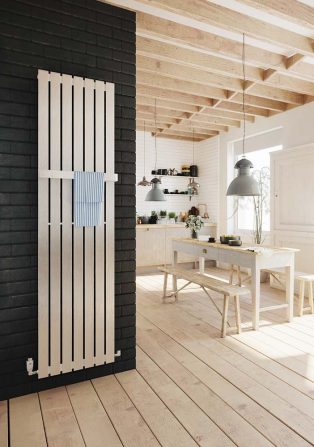Air Source Heat Pumps
Energy Savings Trust currently have cashback loans available up to 40% for energy efficiency measures and up to 75% for renewable heating systems including air source heat pumps. Click here for more information and guidance from Home Energy Scotland on how to get started and apply for the loan. Get up to £17,500 interest-free when you install home renewables with the Home Energy Scotland Loan.
A heat pump captures heat from outside and moves it into your home. It uses electricity to do this, but the heat energy delivered to your home is more than the electrical energy used to power the system.
An air-to-water heat pump transfers heat from the outside air to water, which heats your radiators or underfloor heating. It can also heat water stored in a hot water cylinder for your hot taps, showers and baths.
Heat from the air is absorbed into a fluid. This fluid then passes through a heat exchanger into the heat pump, which raises the temperature and then transfers that heat to water.
For further information on how a heat pump works, including details on typical savings, system design and control.

Is an air-to-water heat pump right for me?
Air-to-water heat pumps are suitable for many types of homes and are the most common type of domestic heat pump, with tens of thousands of installations across the UK. However, there are a few things you should consider before deciding whether a heat pump is right for you.
Do you have somewhere to put it?
You’ll need a place outside your home where a unit can be fitted to a wall or placed on the ground. It must have some space around it to allow a good flow of air.
If you’re not limited by space inside your home, it may be worth the extra cost of installing a split system. Your installer should be able to talk you through your options and help you choose the design that works best for you.
How loud is a heat pump?
The external unit for a heat pump is identical for both monobloc and split heat pumps. Noise is created by large fans moving air across the heat exchanger.
Unless the heat pump is working very hard (ie in cold weather or producing high temperature water), you can expect the noise to be a similar volume to a fridge, if you were standing within a couple of metres. You could easily hold a normal conversation next to it, without raising your voice. As it gets colder outside, this noise will increase in volume while it’s operating, but should still allow you to hold a conversation easily, only raising your voice a little.
The inside unit for a split system only contains valves and pumps and makes very little noise at all.
How will you heat the rooms in your home?
Most homes in the UK use radiators or underfloor heating to circulate hot water – this is referred to as a ‘wet’ system. Air-to-water heat pumps need a wet system.
Don’t want or can’t install a wet heating system? An air-to-air heat pump could work for you.
Do you have a hot water cylinder?
A standard heat pump can’t provide hot water on demand like a combi boiler, so you will need a way of storing hot water for when you need it. The size of hot water cylinder required will depend on the amount of hot water that your household typically uses, but the cylinder can usually be fitted inside any cupboard that measures around 80x80cm.
How much does and air to water heat pump cost?
The cost of an air-to-water heat pump varies depending on the brand, model and size of heat pump, the size of the property, whether it’s a newbuild or an existing property, as well as whether you need to change the way you distribute heat around your property. Typical costs are around £7,000 to £13,000, and we recommend speaking to at least three installers to provide a quote for your heat pump system to give you the best idea of likely costs for your home.
Will a heat pump save me money on my energy bills?
Running costs will depend on how your heat pump is designed and how it is operated. Savings on your energy bill will also be affected by the system you are replacing.
